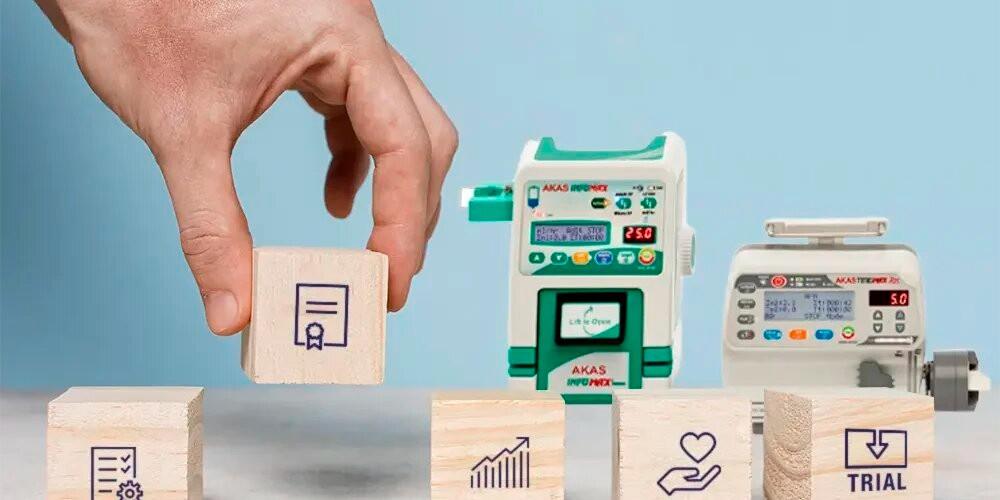In 2025, patient safety and clinical accuracy remain at the heart of hospital care. As technology evolves, so do the expectations surrounding drug delivery. Selecting the right Infusions Pump Distributor is not just a logistical decision—it is a critical aspect of patient care. With rising demand, stringent regulations, and the need for consistent performance, every healthcare institution must choose its distribution partners with care.
1. Start with Distributor Accreditation and Compliance
- Hospitals must verify that the Infusions Pump Distributor complies with national and international quality standards.
- Certifications such as ISO 13485, CE Marking, and US FDA approval are important signals of product integrity and manufacturing compliance.
- Accredited distributors ensure traceability, product safety, and adherence to current health regulations.
2. Prioritise Clinical Experience and Market Longevity
- Distributors with a long-standing presence in the market offer greater stability and proven service reliability.
- Experience in supplying to hospitals and specialised units (ICUs, NICUs, oncology wards) reflects operational maturity.
- Look for case histories, references, or testimonials from hospitals that have worked with the Infusions Pump Distributor.
3. Focus on Device Compatibility and Product Range
- Hospitals benefit from distributors offering a wide range of infusion pump models, including volumetric and syringe types.
- Compatibility with existing infrastructure (power supplies, mounting systems, EMR integration) enhances clinical efficiency.
- Ask for detailed specifications and sample performance reports to match technology with actual patient care needs.
4. Evaluate Distribution Capacity and Lead Times
- Timely availability of infusion pumps can directly affect patient treatment schedules and hospital operations.
- A dependable Infusions Pump Distributor must have robust warehousing, strong regional presence, and assured lead times.
- Delays in delivery or poor supply chain management can impact emergency response and critical care preparedness.
5. Understand the Distributor’s Technical Support Network
- Hospitals must ensure that post-installation support is readily available through skilled engineers and certified technicians.
- Look for service centres or representatives who offer on-site training, maintenance, and quick resolution times.
- A trustworthy Infusions Pump Distributor provides warranty support and ongoing service coverage as part of their commitment.
6. Insist on Customised Training and Clinical Education
- Effective training allows hospital staff to use infusion pumps safely and efficiently.
- Distributors should offer user manuals, simulation tools, and in-person or virtual demonstrations.
- Training modules tailored for specific departments (paediatrics, surgery, ICU) enhance staff confidence and patient safety.
7. Review Digital Integration and Smart Capabilities
- Modern infusion pumps come equipped with features like drug libraries, dose error reduction systems, and wireless monitoring.
- The Infusions Pump Distributor must demonstrate how their devices integrate into hospital IT systems and comply with cybersecurity protocols.
- Ask about firmware updates, software compatibility, and ongoing technical advancements to future-proof your facility.
8. Seek Evidence of Regulatory and Recall Readiness
- Hospitals should ask how the distributor handles device recalls, defect management, and regulatory updates.
- A responsible Infusions Pump Distributor will have a transparent system in place for reporting and replacing affected units.
- Regular compliance audits and proactive communication help maintain high standards of care across all departments.
9. Evaluate Cost Transparency and Value Packages
- Distributors must provide clear, itemised pricing with no hidden costs or unexpected service charges.
- Ask for total cost-of-ownership estimates including accessories, consumables, training, and service contracts.
- Value-based packages that bundle devices with support services reduce administrative burden and improve budget forecasting.
10. Ensure Strong Communication and Accountability
- Good distributors respond quickly, provide timely updates, and assign dedicated contact persons for hospitals.
- A professional Infusions Pump Distributor maintains open communication with biomedical teams and procurement departments.
- Establish service-level agreements (SLAs) to define response timelines, issue escalation protocols, and performance expectations.
11. Partner with a Distributor Aligned with Patient-Centric Goals
- Hospitals should work with distributors who prioritise patient safety, innovation, and ethical medical practice.
- Look beyond the product to understand the company’s commitment to quality care, sustainability, and social responsibility.
- An ideal Infusions Pump Distributor is not just a supplier—but a trusted healthcare partner.
12. Explore International Supply Capabilities and Local Support
- For hospitals operating across regions, global logistics paired with local expertise is essential.
- A well-established Infusions Pump Distributor will have multilingual teams, regional hubs, and consistent quality standards worldwide.
- Cross-border experience ensures smoother customs clearance, documentation, and emergency deployments in remote areas.
13. Adaptability to Changing Clinical Needs
- Hospitals must choose distributors who are agile in responding to evolving medical trends and challenges.
- Whether it’s pandemic preparedness, critical shortages, or new treatment protocols—adaptability matters.
- A flexible Infusions Pump Distributor adjusts product offerings and support structures to meet urgent healthcare needs.
14. Investigate Sustainability Practices and Green Logistics
- Environmentally responsible distributors contribute to hospital sustainability targets.
- Inquire about reusable packaging, energy-efficient equipment, and end-of-life disposal policies.
- An ethical Infusions Pump Distributor should align with the global push towards greener healthcare operations.
Conclusion:
Selecting the right Infusions Pump Distributor is more than a procurement task—it is a decision that impacts patient safety, clinical efficiency, and hospital reputation. Every hospital in 2025 must prioritise quality, transparency, service, and adaptability when evaluating potential partners. Strong distributor relationships ensure that infusion technologies reach caregivers promptly and perform reliably when lives depend on them most.
For hospitals seeking trusted and world-class solutions in drug delivery, Akasinfusion stands out as a manufacturer committed to excellence. With advanced technologies and a caring vision, Akasinfusion designs volumetric infusion pumps and other critical care devices that uphold the highest standards in hospital care.





Comments